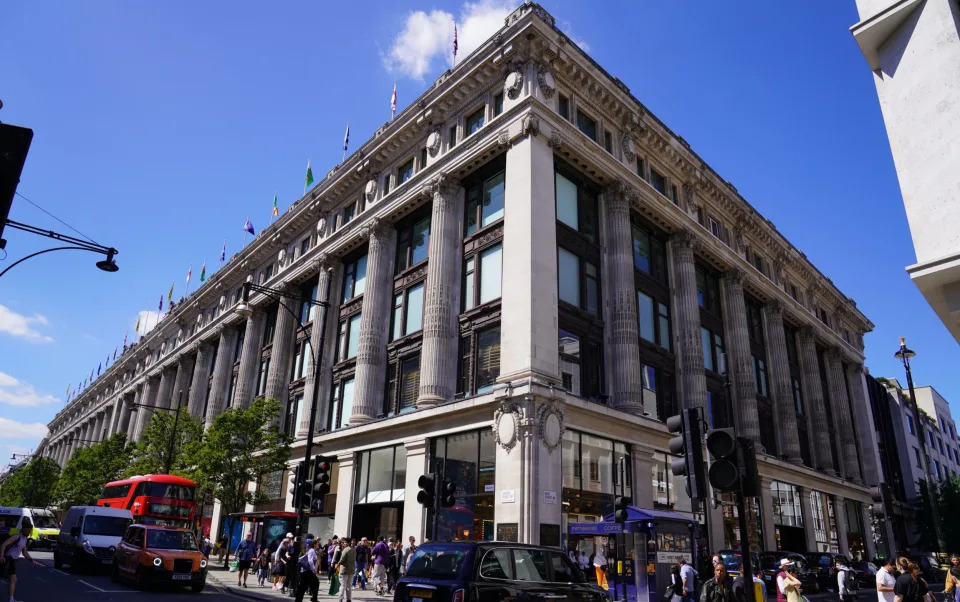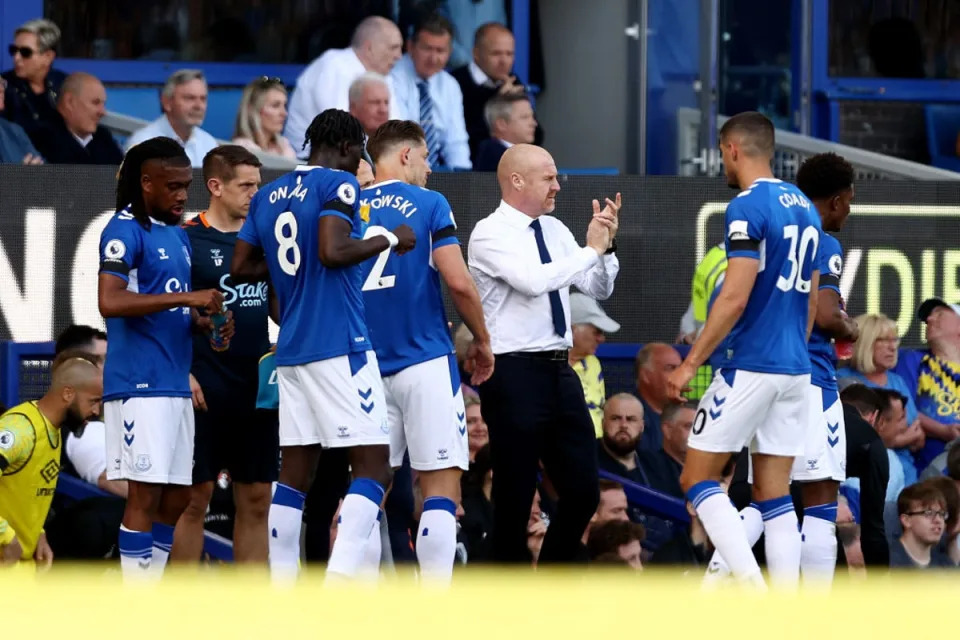VULTURE CAPITALI$M
Saudi Arabia and Gucci owner circle SelfridgesLuke Barr
Sat, 16 March 2024

Selfridges was bought by Signa and Central in a £4bn deal in 2021
- OGULCAN AKSOY/OGULCAN AKSOY
Saudi Arabia and Gucci-owner Kering are said to be circling Selfridges as the insolvency of the department store’s co-owner triggers a battle for the business.
Saudi Arabia’s Public Investment Fund (PIF) and luxury goods giant Kering, which is owned by French billionaire Francois Pinault, are both thought to be interested in a stake in Selfridges, according to City sources.
Interest has been triggered by the collapse of Signa, the Austrian company run by businessman Rene Benko that owns half of Selfridges’ property company.
The insolvency has led to its stake in the retailer becoming available. City sources have said Selfridges is in play but the sale process is complicated by proceedings in Austria.
Saudi Arabia and Gucci-owner Kering are said to be circling Selfridges as the insolvency of the department store’s co-owner triggers a battle for the business.
Saudi Arabia’s Public Investment Fund (PIF) and luxury goods giant Kering, which is owned by French billionaire Francois Pinault, are both thought to be interested in a stake in Selfridges, according to City sources.
Interest has been triggered by the collapse of Signa, the Austrian company run by businessman Rene Benko that owns half of Selfridges’ property company.
The insolvency has led to its stake in the retailer becoming available. City sources have said Selfridges is in play but the sale process is complicated by proceedings in Austria.

Collapse of Austrian tycoon Rene Benko's company Signa could trigger a bidding war for Selfridges - GEORG HOCHMUTH/AFP
It is understood that Selfridges’ other co-owner, Thailand’s Central Group, is seeking a new partner as the future of fellow shareholder Signa looks increasingly uncertain.
Saudi Arabia’s Public Investment Fund (PIF) is one of the parties understood to be interested in Signa’s stake, which covers Selfridges’ retail brand and its lucrative real estate on Oxford Street.
It comes after The Telegraph revealed last year that the kingdom was a private financial backer in the sale of Selfridges two years ago, which was conducted following an auction by the Weston family.
Saudi’s involvement stemmed from it providing the finance for Signa’s investment. It therefore could be in pole position should a bidding war for Selfridges emerge.
The Gulf kingdom has been on a dealmaking spree in recent years that has seen it invest heavily abroad, including in Britain where it has bought Newcastle United FC among others.
However, PIF could face competition from luxury goods giant Kering, City sources say.
Paris-listed Kering is worth €52bn and owns a suite of luxury brands including Gucci, Balenciaga, Yves Saint Laurent and Alexander McQueen.
The company has recently been buying up luxury retail space. In January, it bought the 115,000 square foot Fifth Avenue building home to its New York Gucci store for $963m.
A banker familiar with the matter described Central Group as the “king-maker” in the sale process, which is still in its early stages as Signa unravels.
Interested parties are believed to be waiting for a full outcome from Signa’s collapse before they formally declare an interest in the stake, which would be worth around £2bn.
“What Central are doing is watching their partner’s problems play out,” the source said. “Sitting, watching to see how it breaks. Of course, they are naturally interested to see what happens because they are going to have a new partner.
“It’s between retailing dynasties and sovereign wealth funds.”
Selfridges was bought by Signa and Central in a £4bn deal in 2021, with the business split between an operating company and a property company.
Both had been jointly owned by Signa and Central.
However, Central moved to seize control of the operating business during the turmoil at Signa late last year, converting a €364m (£317m) loan into a majority stake in the business.
Despite this, Signa still owns 50pc of the property company and holds around 35pc in the operating company.
Signa’s downfall led to Mr Benko filing for personal insolvency earlier this month, four months after his company crumbled under the weight of high interest rates and dwindling valuations.
Amid questions around its ownership, Selfridges has maintained that it trades independently of any support from its shareholders.
However, the situation has cast a shadow over the retailer, which has also been racing to cut costs in a major efficiency drive.
Last August, it unveiled plans to slash roles in its head office.
Andrew Keith, Selfridges managing director, told workers at the time that the company needed to be “fit for the future, aligned and working in the most efficient way”.
He said: “Regrettably this is likely to mean some of our head office teams, including some small teams in retail who support our stores, will be resized and reshaped.”
The move followed a year in which Selfridges lost almost £40m after it recorded a jump in costs.
Accounts for Selfridges Retail, which covers the business’s four UK stores, its website and its mobile app, revealed the company was struck by higher debt interest costs during the year to January 2023.
Its interest expense on lease liabilities was close to £100m, around 20pc higher than the prior year.
Signa and Central loaded Selfridges up with more than £1.7bn of debt in autumn 2022 by booking loans through a number of new trading and property entities.
Central Group and Selfridges declined to comment.
Kering declined to comment. PIF was contacted for comment.
Controversial Everton bidder 777 Partners sees owning football club as way to snap up sportstech bargains
Daniel O'Boyle
Fri, 15 March 2024

The controversial investment firm sees owning football clubs as a way to identify underpriced buyout targets in the sports tech sector, the Standard can reveal (Getty Images)
777 Partners, the controversial London and Miami investment firm that awaits approval for its deal to buy Everton, sees owning football clubs as a way to identify underpriced buyout targets in the sports tech sector, the Standard can reveal.
The companies in question could be a ‘salesforce for football’ or a statistical data provider, 777 head of Europe John Jeffery suggested.
777 - which runs its European operations from Mayfair and already owns clubs in five other countries, as well as basketball’s London Lions - agreed to buy the Premier League stalwarts in September, but final approval from the league has taken much longer than the average deal.
Jeffery told the Standard that the once-obscure firm, which mostly dealt in life insurance and annuities for lawsuit winners, saw four main benefits to being in football.
Three of those benefits are about owning multiple teams: lower revenue volatility, the ability to move players between clubs and a chance to attract directors best suited to a certain budget.
But with the fourth, Jeffery offered a reason why 777 decided to get into buying clubs in the first place. He said 777 could buy out a potential sportstech unicorn at a bargain price, because it would have a better view of the top products on the market.
The firm has already used this business model - buying the "strategic fulcrum" of a sector, and then the adjacent companies it sees as undervalued - in other sectors like insurance.
He said: “We feel like we have a better understanding of the market as a customer ourselves. We can say ‘forget all the Gartner [market research] reports, forget everything. We know what the best software in the market is for this particular problem because we have this problem and we use all the software... So we're going to go about buying it’.”
He insists the model is more effective than researching the sector without playing an active part in the sport, enough to justify the large costs involved in buying top teams and keeping them running.
The firm may also work on building its own products to fill spaces where there wasn’t an existing company to buy. It has already done that in the insurance space, making a product to hedge life insurance payouts using equity release deals, so that a surge in deaths would not mean a big hit to the firm’s profits.
But he added that - for every club the firm owns - 777 would have to work on shoring up the finances in the short-term before it can think about a buying spree. He also noted it would be “insulting” to fans to focus entirely on selling some recently acquired software at the expense of results.
777 has spent months awaiting Premier League approval for its deal to buy Everton, as football owners face greater scrutiny and the firm has been the subject of lawsuits, some from creditors that say they’re owed money. The unusually lengthy process has already led to a point deduction for the club, with a six-point penalty (reduced from 10) moving them from mid-table to a potential relegation fight.
According to reports today, the Premier League is likely to make a decision on the club next week. If the deal is not approved, the future of the debt-heavy club is unclear.
American newsletter Semafor last year raised questions over the source of 777’s funding for the deal, claiming that the company used money from insurance premiums - usually put into secure assets like high-rated bonds - to finance its sporting investments.
Jeffery admitted that those funds were used to invest in clubs, but added that the insurance investments are handled by an “independently run operating company with an independent board that is regulated”, Jeffery said.
He said that leadership does pitch investment opportunities to that board, but that “they can say no and there’s nothing I can do about it.”
But in the case of the football investments, he said “they took it away, they did their due diligence, and they made the decision that they wanted to invest.”
In the capital, the London Lions basketball team has faced its own difficulties since the acquisition. The club’s 2022 accounts are currently overdue. But Jeffery says that its troubles lie with those managing the club on a day-to-day basis.
He said: “It’s run day-to-day, there’s no input.
“We’re often as surprised as everyone else when there’s a negative headline. We know when you know.”
Daniel O'Boyle
Fri, 15 March 2024

The controversial investment firm sees owning football clubs as a way to identify underpriced buyout targets in the sports tech sector, the Standard can reveal (Getty Images)
777 Partners, the controversial London and Miami investment firm that awaits approval for its deal to buy Everton, sees owning football clubs as a way to identify underpriced buyout targets in the sports tech sector, the Standard can reveal.
The companies in question could be a ‘salesforce for football’ or a statistical data provider, 777 head of Europe John Jeffery suggested.
777 - which runs its European operations from Mayfair and already owns clubs in five other countries, as well as basketball’s London Lions - agreed to buy the Premier League stalwarts in September, but final approval from the league has taken much longer than the average deal.
Jeffery told the Standard that the once-obscure firm, which mostly dealt in life insurance and annuities for lawsuit winners, saw four main benefits to being in football.
Three of those benefits are about owning multiple teams: lower revenue volatility, the ability to move players between clubs and a chance to attract directors best suited to a certain budget.
But with the fourth, Jeffery offered a reason why 777 decided to get into buying clubs in the first place. He said 777 could buy out a potential sportstech unicorn at a bargain price, because it would have a better view of the top products on the market.
The firm has already used this business model - buying the "strategic fulcrum" of a sector, and then the adjacent companies it sees as undervalued - in other sectors like insurance.
He said: “We feel like we have a better understanding of the market as a customer ourselves. We can say ‘forget all the Gartner [market research] reports, forget everything. We know what the best software in the market is for this particular problem because we have this problem and we use all the software... So we're going to go about buying it’.”
He insists the model is more effective than researching the sector without playing an active part in the sport, enough to justify the large costs involved in buying top teams and keeping them running.
The firm may also work on building its own products to fill spaces where there wasn’t an existing company to buy. It has already done that in the insurance space, making a product to hedge life insurance payouts using equity release deals, so that a surge in deaths would not mean a big hit to the firm’s profits.
But he added that - for every club the firm owns - 777 would have to work on shoring up the finances in the short-term before it can think about a buying spree. He also noted it would be “insulting” to fans to focus entirely on selling some recently acquired software at the expense of results.
777 has spent months awaiting Premier League approval for its deal to buy Everton, as football owners face greater scrutiny and the firm has been the subject of lawsuits, some from creditors that say they’re owed money. The unusually lengthy process has already led to a point deduction for the club, with a six-point penalty (reduced from 10) moving them from mid-table to a potential relegation fight.
According to reports today, the Premier League is likely to make a decision on the club next week. If the deal is not approved, the future of the debt-heavy club is unclear.
American newsletter Semafor last year raised questions over the source of 777’s funding for the deal, claiming that the company used money from insurance premiums - usually put into secure assets like high-rated bonds - to finance its sporting investments.
Jeffery admitted that those funds were used to invest in clubs, but added that the insurance investments are handled by an “independently run operating company with an independent board that is regulated”, Jeffery said.
He said that leadership does pitch investment opportunities to that board, but that “they can say no and there’s nothing I can do about it.”
But in the case of the football investments, he said “they took it away, they did their due diligence, and they made the decision that they wanted to invest.”
In the capital, the London Lions basketball team has faced its own difficulties since the acquisition. The club’s 2022 accounts are currently overdue. But Jeffery says that its troubles lie with those managing the club on a day-to-day basis.
He said: “It’s run day-to-day, there’s no input.
“We’re often as surprised as everyone else when there’s a negative headline. We know when you know.”
No comments:
Post a Comment